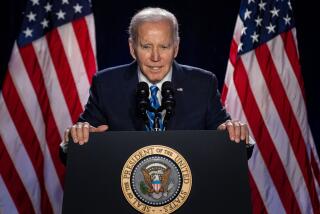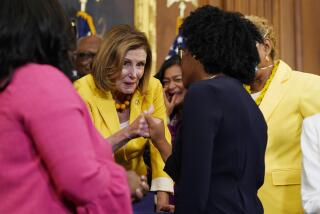Clinton Urges Democrats to Fight for Health Bill
WASHINGTON — President Clinton made the rounds of Capitol Hill on Wednesday to promote his health care agenda, offering a spoonful of conciliatory honey to Republican senators whose support he hopes to win and following it with a dash of combative vinegar to stiffen the resolve of Democratic House members.
Clinton, accompanied by a phalanx of top Administration officials, conducted the series of closed meetings as a send-off for Congress as it prepares to adjourn for its Memorial Day recess.
For Democrats in particular, the weeklong break could be a time of intense pressure from constituents and interest groups at home. Clinton’s health care plan is encountering difficulties in all five congressional committees considering it. Democrats are also nursing their wounds from a special election in Kentucky--hailed by Republicans as a referendum on Clinton’s policies--that saw one congressional district fall into GOP hands for the first time in more than a century.
As Clinton left a session with House and Senate Democratic leaders--the first of three with various groups in Congress in his three hours on Capitol Hill--he said his health care bill is “something we very much want to do in a bipartisan fashion.”
But by the end of the third meeting, which was a pep rally for the entire Democratic membership of the House, it was clear that Clinton was in a more confrontational mood.
“The President told us something that was important for us to hear: If we really want to accomplish something, we’ve got to fight for it,” said Rep. Henry A. Waxman (D-Los Angeles), who is one of Clinton’s chief House allies in the health care battle.
Rep. Pat Williams (D-Mont.), another subcommittee chairman with jurisdiction over health, said: “He used the word ‘fight’ half a dozen times.”
Only one of the closed sessions included any Republican participants--and it was the idea of Senate Majority Leader George J. Mitchell (D-Me.) to invite them. However, Democrats and Republicans alike said Clinton had been solicitous at the session and eager to hear the views of both sides.
Republicans said they told Clinton bluntly that the linchpin of his plan--a requirement that employers pay for their workers’ health coverage--will not pass.
“I told him, ‘Mr. President, I support mandates. I will support mandates, but I think if this bill has mandates, it loses,’ ” Sen. Bob Packwood (R-Ore.) said. Packwood is the ranking Republican on the Senate Finance Committee, which is considered difficult territory for Clinton’s plan.
On a more positive note for the Administration, a second House subcommittee managed to approve a version of the Clinton plan shortly before the President arrived on Capitol Hill.
The House Education and Labor Committee’s labor-management relations subcommittee chaired by Williams voted, 17 to 10, in favor of the plan. It passed strictly along party lines, without a single GOP vote in favor.
The bill contains the basic elements of the Clinton plan but substitutes voluntary purchasing cooperatives for mandatory health alliances. It also contains more generous benefits in such areas as women’s health, mental health and dental care, and increases subsidies to help small businesses afford their workers’ coverage.
More to Read
Get the L.A. Times Politics newsletter
Deeply reported insights into legislation, politics and policy from Sacramento, Washington and beyond. In your inbox three times per week.
You may occasionally receive promotional content from the Los Angeles Times.










